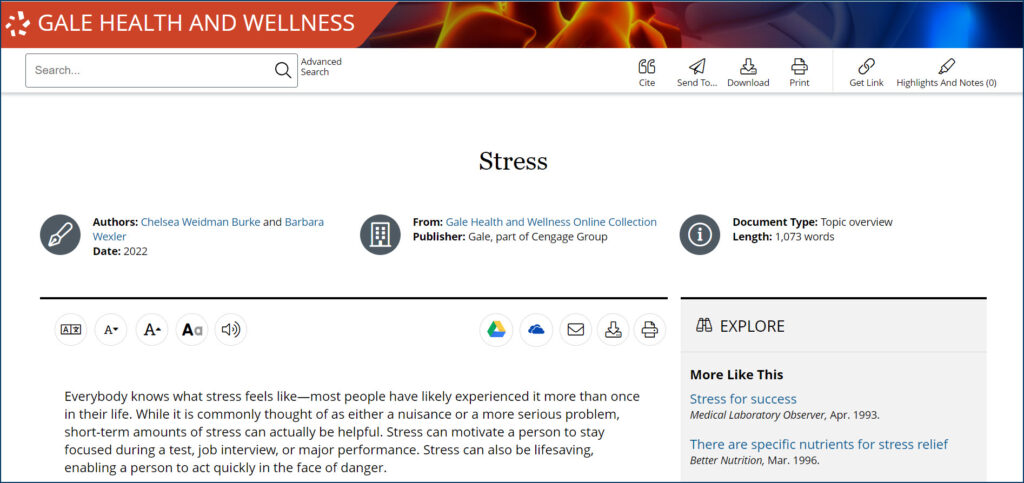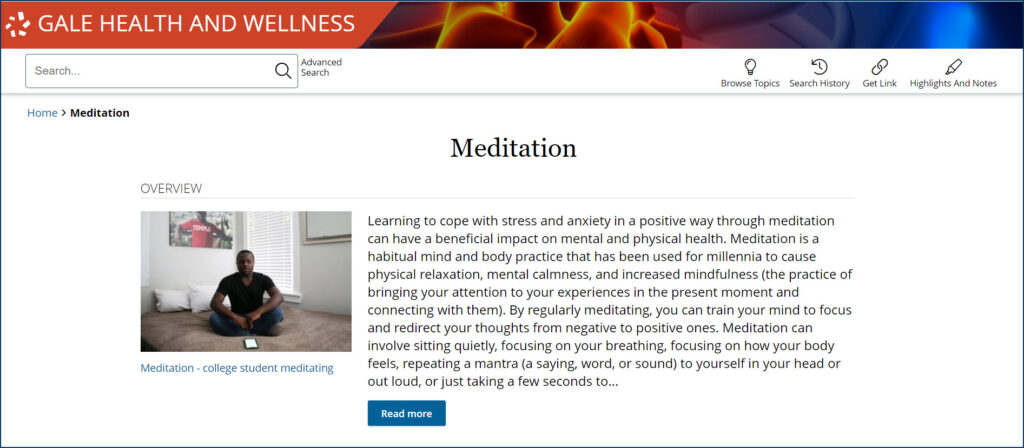Americans are stressed. According to the World Health Organization, stress is a biological response to a challenging or threatening situation. It’s normal and natural to experience some degree of stress, but not everyone has the tools to manage it well, and too much stress can lead to mental and physical health consequences.
No single cause is to blame for the country’s elevated stress levels. In an American Psychiatric Association poll, individuals identified the following significant stressors: personal finances, physical and mental health, relationships, job security, and romantic relationships (not to mention the upcoming election). With many catalysts for stress and so many people struggling, accessible resources and coping tools are vital.
April is National Stress Awareness Month, presenting a key opportunity to integrate stress awareness and support within your library space. A dedicated month for topics around stress can spark helpful conversations and reduce stigma about mental health struggles. Librarians can rely on Gale Health and Wellness to assist in these important ventures. Whether for your own programming or for patrons to use as a reference, Gale Health and Wellness is a valuable database to help combat the stress epidemic in our communities.
Discover a Wealth of Information
One of the most essential tools in your stress-management toolkit is information. Gale Health and Wellness hosts curated collections around special topics; of course, we have one dedicated to stress.
The collection begins with a crafted stress summary page to help users learn the basics, including the common sources and symptoms of stress and strategies to deal with disruptive stress levels. From there, users can access over a hundred related reference pages, each organized in an approachable format, guiding users to those resources best adapted to their unique concerns. For example, our dedicated page on teens and stress is an essential source for younger patrons unsure of where to find support or concerned parents seeking ways to help their struggling child.

Each page features direct links to adjacent topics and articles for more in-depth reading. Plus, every resource housed in Gale Health and Wellness includes critical accessibility features, including audio versions, dozens of translations, and the ability to adjust text to accommodate those with visual impairments — users can even download files for personal devices.
When it comes to destigmatizing mental health and providing the building blocks for a solution, reliable and accessible information matters. That’s where Gale Health and Wellness comes in; make this database the focal point of your April programming so patrons know this resource is readily available to them.
Take the Next Step
Gale Health and Wellness presents reliable information and guidance on strategies to access support and additional resources. If your library hopes to bring attention to National Stress Awareness Month, you can leverage the database to collect targeted information, then compile and share it through brochures, posters, or social media posts for your patrons. Action steps are embedded throughout Gale’s various stress-related portals. For example, our resilience page, which guides readers on developing coping skills, provides an overview of several support agencies and their contact information: SAMHSA’s National Helpline, 211.org, SafeHouse Center HelpLine, and Crisis Text Line.
Many of Gale’s mental health–related resources feature expert advice on transforming knowledge into meaningful practice. For example, individuals recovering from a traumatic event can find a CDC video with guidance on managing PTSD. Those experiencing professional burnout can discover helpful stress management advice from The New York Times. People struggling to sleep can access a simple guide on improving their sleep routine. You can easily share these valuable resources through your library’s social media platforms and outreach materials.
From videos to magazine articles to podcasts, Gale Health and Wellness has everything you need to feel empowered and take the next step toward healthy coping mechanisms.
Develop Programming for Stress-Free Living
With the articles and tips in Gale’s dedicated stress collection, get informed and inspired to host your own programming.
Host a Yoga Class or Guided Meditation
Meditation is a helpful and accessible practice for stress reduction. Share the meditation portal in Gale Health and Wellness and host a guided meditation at the library. You could facilitate the meditation or invite an expert from a nearby retreat or yoga center. Focus on low-barrier strategies like breathing exercises, positive mantras, and aromatherapy.

Give Away Free Journals
If funding allows, give away stress journals to interested patrons throughout April for Stress Awareness Month. Or, create simple postcards that explain the benefits of written expression. You could even invite someone, whether a local instructor or mental health specialist, to speak on the practice of journaling. Science supports the claim that expressive journaling can help reduce stress. Encourage your library users to put their concerns down on paper rather than bottling them up.
Get Outside
Depending on where you live, April may bring sunny days and pleasant springtime temps. If weather permits, move your traditional library programming (such as workshops or store hours) outside instead. Outdoor spaces can help improve mental health, especially for elderly community members.
Check Your Blood Pressure
Prolonged stressful situations can lead to high blood pressure (or hypertension), which is a serious health concern. You can contact your local American Heart Association about installing a blood pressure hub at your library for National Stress Awareness Month. Many people aren’t even aware that they suffer from high blood pressure, so it’s crucial to provide an easy and free way to check it. You might even incentivize your patrons with some library swag or raffle entries.
This April, find opportunities to introduce your library patrons to the powerful resources housed in Gale Health and Wellness and use this information to support your programming. And don’t forget to carve out your own self-care time as well; you can’t support others without sustaining yourself first.
If your library doesn’t already subscribe to Gale Health and Wellness, contact your local rep today to learn more about our suite of databases.

